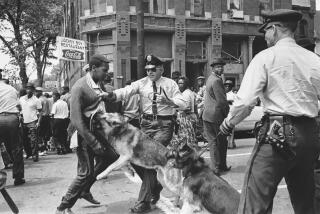Is There Nothing Left to Lose to Urban Despair? : Crime: Rosa Parks triumphed in Alabama only to become another victim of random assault in Detroit.
- Share via
The man accused of assaulting Rosa Parks in Detroit a few weeks ago could have passed you on the street that day, no matter where you live. You wouldn’t have to be poor, be black, be somewhere you shouldn’t be for his kind of trouble to be standing right over your shoulder.
What do we know about him? That he’s jobless and under 30, living in an abandoned house, apparently unmarried and a drinker, known on the streets as an opportunistic sometime-burglar.
You could have seen him in Times Square looking for action. You could have seen him at the Santa Monica Pier panhandling. The tragedy of America in the ‘90s is that the man accused of assaulting Rosa Parks lives in nearly every city and backwater in the nation, and he has nothing to lose.
The man accused of assaulting Rosa Parks was apprehended outside a grocery store, tackled to the ground by a man his age who recognized him from a police composite. The store is a block from my family’s house. I used to stop there for candy on my way home from school, just one store on a block that used to have a Chinese restaurant, a bakery, a dry cleaners and families living upstairs in apartments. All those things are gone now.
That was in the era, the 1950s, when Rosa Parks was coming into the full flower of her fame--or to segregationists, her brazenness--as the woman whose defiance of an order to move to the back of an Alabama bus avalanched into the modern civil-rights movement.
The time has come, more than ever, to ask ourselves why the life, the commerce, the vibrancy are gone now from so many neighborhoods in America and why, above all, we have become a society in which so many young men have nothing to lose.
The Detroit that I’m speaking of is not the withering hulk that, fairly or not, springs to most minds. It was a Detroit of flush and happy working people, fresh from the factory or department store, fat paycheck in hand. It was a Detroit where new cars flew past on the expressways, stacked three-deep on trailer-trucks headed for Syracuse, Boise and Oklahoma City. A Detroit that was a magnet for ex-GIs, laborers and professional people alike, because, as a friend whose father settled here as a young dentist told me, the word went out that folks were making money here and paid their bills on time.
My parents used to bring home the Michigan Chronicle, the Pittsburgh Courier, the Chicago Defender, proud black newspapers that were packed in those days with the details of the civil-rights struggle: the marches, the political defeats, the court victories, the photographs of “first” black telephone operators and utility company clerks, the murders of Southern black leaders like Medgar Evers. It’s easy from a comfortable distance to romanticize the era and forget that, for too many, it was a life and death struggle.
And it is still unknown. Rosa Parks was beaten by a young man who could, in fact, owe her his life. Yes, owe it to her, in the sense that 40 years of change have, at a minimum, reduced hunger, lessened police brutality, reduced the chances of an emergency hospital turning him away. But the work is only half done. Look at all the young people, especially men, who have nothing to lose. No job to lose if they land in jail. No family to jeopardize if the paychecks stop coming.
While we may have created a generation with nothing to lose, there is not one among us who was born to lose.
More to Read
Sign up for Essential California
The most important California stories and recommendations in your inbox every morning.
You may occasionally receive promotional content from the Los Angeles Times.










